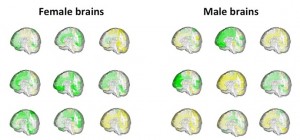Dec
08
2015
 Fear is an adaptive emotion, phylogenetically ancient, and anatomically located mostly in the amygdala, which is part of the limbic system. Understanding fear, however, is about more than neuroanatomy. It is interesting to think what people generally fear, why, and what do they do about it.
Fear is an adaptive emotion, phylogenetically ancient, and anatomically located mostly in the amygdala, which is part of the limbic system. Understanding fear, however, is about more than neuroanatomy. It is interesting to think what people generally fear, why, and what do they do about it.
Fear is an anxious feeling that can focus on either a current active threat (like being chased by a predator) or on the anticipation of a future negative event. It’s easy to see how that feeling would be adaptive – we worry about bad things happening in the future so that we will take action to prevent or at least mitigate them.
What We Fear?
Psychologists have identified five basic fears, out of which most other fears are based. They are: fear of death, mutilation, loss of autonomy, separation, and “ego death” which is the fear of humiliation or shame.
Despite the obvious adaptive function of fear, many people fear the wrong things, meaning that their fear and anxiety is not proportional to actual threat. This mismatch is maladaptive, so why is it the case?
Continue Reading »
Dec
07
2015
 Steorn is an Irish company that has been promising for years that they have pioneered what is essentially a free-energy device. They recently announced that they now have two devices available for pre-order. The OCube is a USB charging device that they are selling for €1,200, and the OPhone which is a cell phone that never has to be recharged.
Steorn is an Irish company that has been promising for years that they have pioneered what is essentially a free-energy device. They recently announced that they now have two devices available for pre-order. The OCube is a USB charging device that they are selling for €1,200, and the OPhone which is a cell phone that never has to be recharged.
I first wrote about Steorn in 2007 when they promised a live demonstration of their free-energy technology, a demonstration that never manifested. Steorn did not give up their claims. In 2009:
Twenty-two independent scientists and engineers were selected by Steorn to form this jury. It has for the past two years examined evidence presented by the company. The unanimous verdict of the Jury is that Steorn’s attempts to demonstrate the claim have not shown the production of energy. The jury is therefore ceasing work.
Continue Reading »
Dec
04
2015
 The job of theoretical physicists is describing the universe – a complex, subtle, and extremely weird place from a human perspective. It seems weird because we occupy a certain range of size and distance, which has adapted our intuition to a very narrow range of reality.
The job of theoretical physicists is describing the universe – a complex, subtle, and extremely weird place from a human perspective. It seems weird because we occupy a certain range of size and distance, which has adapted our intuition to a very narrow range of reality.
It is amazing that we have been able to use our collective intellect to probe the universe at scales of size, distance, and time that are vastly outside our experience. Two tools of intellectual rigor have made this possible – math and science.
Theoretical physicists sometimes rely more on the former than the latter. This means they spend their time constructing mathematical descriptions of the universe based upon what is already known. They are thinking about what might be, and then seeing if they can make the math work out.
Such a process is part of science, but it does not close the loop on science until the mathematical models are tested against reality in some way. This may pose theoretical or practical hurdles.
Continue Reading »
Dec
03
2015
 A new study is getting a lot of attention, partly because of its provocative title: On the reception and detection of pseudo-profound bullshit. It also seems that people generally like to hear stories about how dumb other people are. That is why I often emphasize that such studies are not about “other” people, they are about people.
A new study is getting a lot of attention, partly because of its provocative title: On the reception and detection of pseudo-profound bullshit. It also seems that people generally like to hear stories about how dumb other people are. That is why I often emphasize that such studies are not about “other” people, they are about people.
In this case, however, the researchers do find that there are subsets of subjects who react differently to what they call “pseudo-profound bullshit.” They write:
Here we focus on pseudo-profound bullshit, which consists of seemingly impressive assertions that are presented as true and meaningful but are actually vacuous. We presented participants with bullshit statements consisting of buzzwords randomly organized into statements with syntactic structure but no discernible meaning (e.g., “Wholeness quiets infinite phenomena”).
Continue Reading »
Dec
01
2015
 Is it more accurate to say that male and female brains are generally the same or categorically different? This question has been somewhat of a controversy, both scientifically and culturally. A new extensive comparison of male and female brains with fMRI scans hopes to provide a definitive answer.
Is it more accurate to say that male and female brains are generally the same or categorically different? This question has been somewhat of a controversy, both scientifically and culturally. A new extensive comparison of male and female brains with fMRI scans hopes to provide a definitive answer.
First for some background, we need to address the basic question of how we even approach or address the issue of categorization. Nature is fuzzy and complex, but humans tend to prefer neat and tidy categories to simplify the task of keeping track of everything, and even to help our understanding. There is therefore frequently a conflict between our desires and reality when it comes to creating categories.
The Pluto controversy is a good example of this, one which was surprisingly heated despite the fact that there are no real social or political issues at stake. There is no objective and definitive line between planets as solar system objects and other planet-like objects. Astronomers had to come up with some rules, rules that are unambiguous to apply. Ideally, such rules of categorization will reflect some underlying phenomenon, in this case, for example, how planets form.
Continue Reading »
 Fear is an adaptive emotion, phylogenetically ancient, and anatomically located mostly in the amygdala, which is part of the limbic system. Understanding fear, however, is about more than neuroanatomy. It is interesting to think what people generally fear, why, and what do they do about it.
Fear is an adaptive emotion, phylogenetically ancient, and anatomically located mostly in the amygdala, which is part of the limbic system. Understanding fear, however, is about more than neuroanatomy. It is interesting to think what people generally fear, why, and what do they do about it.









